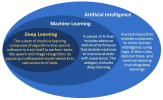link6
Member
BLUF: A short list of extremely low-barrier resources to help applicants who would like to strengthen their IWC DCO eligibility by developing data-science and AI/ML familiarity and skills.

tl;dr: Hi all,
As you're likely aware, for better or for worse data science and AI/ML are regarded as "desired" skills for a few IWC designators. I had zero knowledge of these domains until I began a graduate program in a notably "techie" lab 4 years ago, so I appreciate how arcane and inaccessible they can seem at a glance. I personally wasn't sure where to go to get hands-on experience, what material would be too daunting at the outset, or whether these fields are even amenable to self study.
Here, I've compiled a handful of resources that made these domains fun and tractable when I was initially learning the ropes, and which I hope will allow you to dip your toe in the pool before jumping in (e.g., enrolling in a pricey course, or embarking on a comp-sci degree). These are free or "freemium," presuppose no (or minimal) knowledge of computer programming, and require no installs.
Courses:
Daily Practice:
Happy learning!
About me: I am an IWC DCO applicant for the March 2021 cycle (designators 1835 and 1815). As a student, I use Pythonic data-science and AI/ML methods in my research, but I'm absolutely still learning this stuff and am a relative newcomer to these domains. I'd love to hear your favorite low-barrier resources for getting started.

tl;dr: Hi all,
As you're likely aware, for better or for worse data science and AI/ML are regarded as "desired" skills for a few IWC designators. I had zero knowledge of these domains until I began a graduate program in a notably "techie" lab 4 years ago, so I appreciate how arcane and inaccessible they can seem at a glance. I personally wasn't sure where to go to get hands-on experience, what material would be too daunting at the outset, or whether these fields are even amenable to self study.
Here, I've compiled a handful of resources that made these domains fun and tractable when I was initially learning the ropes, and which I hope will allow you to dip your toe in the pool before jumping in (e.g., enrolling in a pricey course, or embarking on a comp-sci degree). These are free or "freemium," presuppose no (or minimal) knowledge of computer programming, and require no installs.
Courses:
Google's Machine Learning Crash Course (https://developers.google.com/machine-learning/crash-course): Teaches key concepts at the heart of ML, like gradient descent, to comp-sci newcomers.
Codecademy Python 3 (https://www.codecademy.com/learn/learn-python-3): A gentle, hands-on intro to the Python programming language. An on-ramp to coding and not a data-science or AI/ML course per se. Freemium content, but I highly recommend just sticking with the free content.
By working your way through ^^these, you'll quickly become conversant in key AI/ML concepts, like reinforcement learning and gradient descent, and you'll gradually develop usable Python skills centered on the most essential (and extremely transferable) scientific libraries.DataCamp's Data Science Track (https://learn.datacamp.com/career-tracks/data-science-for-everyone): Loads of short (e.g., 2- to 4-hour), gamified courses packaged together as a (very big) meta-course. I highly recommend the early modules, which are excellent introductions to data science in general, as well as Python's NumPy, Matplotlib, and Pandas libraries specifically—essential stuff for data scientists. Freemium content here (at $25/mo subscription) is probably worth it if you plan to tackle several courses in short order, but there's a decent amount of free content if you're on a budget.
Daily Practice:
Resources:Edabit Python (https://edabit.com/challenges/python3): A community site with thousands of short Python exercises, sortable by difficulty. Each problem has solutions, commentary, etc. (Like Codecademy, not a data science and AI/ML-focused experience, but a place for succinct, quality practice in syntax and algorithmic thinking, which are key enablers.)
Python for Beginners: (https://wiki.python.org/moin/BeginnersGuide/NonProgrammers): A repository of open-source books, courses, etc. to help anyone get started.
Happy learning!
About me: I am an IWC DCO applicant for the March 2021 cycle (designators 1835 and 1815). As a student, I use Pythonic data-science and AI/ML methods in my research, but I'm absolutely still learning this stuff and am a relative newcomer to these domains. I'd love to hear your favorite low-barrier resources for getting started.
